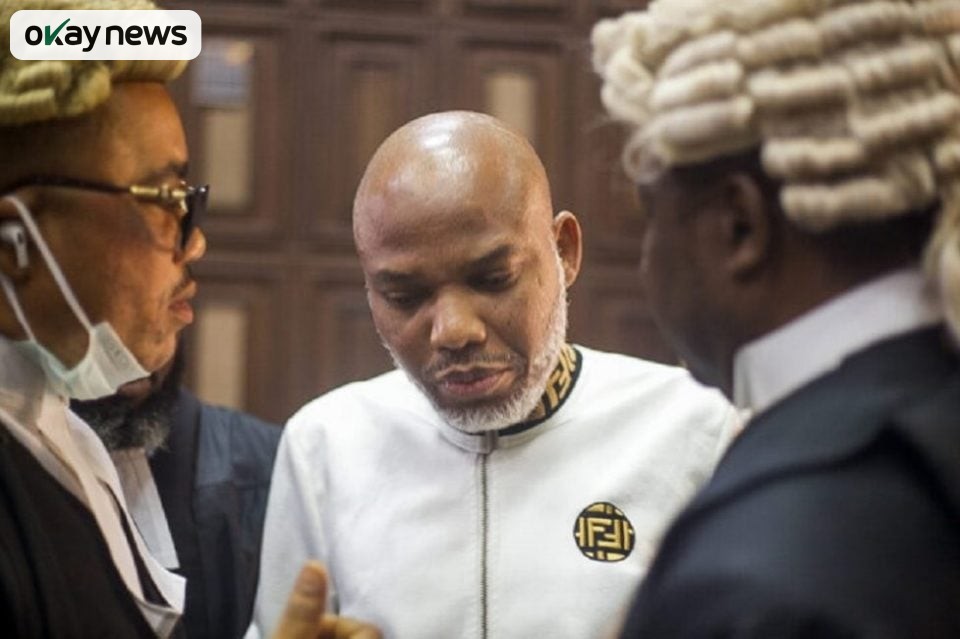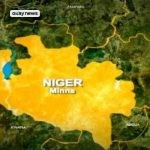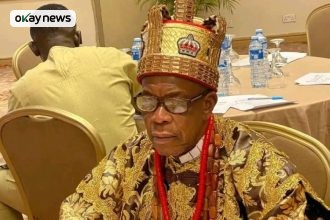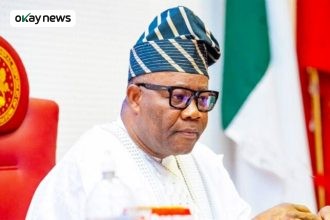The Indigenous People of Biafra, a separatist organisation campaigning for the creation of an independent Biafran state in the South Eastern region of Nigeria, has dismissed the life sentence handed down to its detained leader, Nnamdi Kanu, by the Federal High Court in Abuja. Kanu, who is at the centre of one of Nigeria’s most contentious political and human rights debates, was convicted on seven terrorism-related charges in a judgment delivered on Thursday.
In a strongly worded statement issued on Friday by its spokesperson, Emma Powerful, the group argued that Kanu “committed no offence known to Nigerian law,” maintaining that his actions amounted solely to self-determination. It further insisted that the demand for a referendum is protected under several international charters and conventions. Okay News reports that the case has generated renewed global attention, particularly among human rights organisations monitoring the matter.
Emma Powerful criticised the ruling delivered by Justice James Omotosho, stating that the judge did not properly apply Section 36(12) of the Constitution of the Federal Republic of Nigeria 1999, which clearly provides that no Nigerian can be convicted of a crime unless that offence is defined in a written law. He alleged that the judgment contradicted binding principles of the constitution and previous rulings by higher courts.
He stated, “The Indigenous People of Biafra wishes to inform the global community, diplomatic missions, international media, and lovers of freedom that we shall, in the coming days and weeks, lay bare the fundamental defects, contradictions, and illegalities that define the recent ruling issued by Justice James Omotosho of the Federal High Court, Abuja.
“For the avoidance of doubt, no gun, no grenade, no General Purpose Machine Gun, no explosive, and no attack plan was ever found on Mazi Nnamdi Kanu. None. No witness, civilian or military, ever testified before any court—at any stage—that Mazi Nnamdi Kanu committed any offence known to Nigerian or international law. This is an undeniable fact.
“The only thing the Federal Government continues to criminalise is self-determination, a right guaranteed under Article 20 of the African Charter on Human and Peoples’ Rights, Article 1 of the International Covenant on Civil and Political Rights and Article 1 of the International Covenant on Economic, Social and Cultural Rights. Self-determination is a protected right, not a crime. Agitation is not terrorism, and requesting a referendum is not a weapon.”
The Indigenous People of Biafra further argued that insecurity in the South Eastern region escalated while Kanu was detained by the Department of State Services, stressing that violent incidents recorded during his incarceration cannot be linked to him. The group recounted several historical confrontations between its members and Nigerian security agencies, including the Nigerian Army’s “Operation Python Dance,” which it claimed resulted in casualties that have never been investigated.
According to the organisation, “It was Mazi Nnamdi Kanu who was attacked by the Nigerian military during ‘Operation Python Dance’. It was Indigenous People of Biafra family members who were massacred at Nkpor, Aba, Onitsha, Emene, and other locations. Not one government officer or soldier has been held accountable for these atrocities. Yet the same system now seeks to convict the victim.”
The organisation also questioned the legal basis for the sentencing, describing the ruling as unconstitutional and alleging that the judge relied on obsolete or repealed provisions rather than active legislation.
The statement continued, “Justice Omotosho has demonstrated, sadly, that he either cannot interpret or refuses to interpret simple English contained in Section 36(12) of the 1999 Constitution, which states clearly ‘A person shall not be convicted of a criminal offence unless that offence is defined and the penalty therefor is prescribed in a written law’.
“This constitutional provision is short, simple, and unambiguous. Our questions to Justice Omotosho—questions the entire world deserves answers to—are as follows: What written law did you rely on to purport to convict Mazi Nnamdi Kanu? Is that law extant, or has it been repealed? If the law has been repealed, can a repealed law ever qualify as a written law under Section 36(12)? Why did you ignore binding Court of Appeal and Supreme Court authorities stating that no Nigerian can be tried or convicted under a non-existent or repealed statute?”
The Indigenous People of Biafra disclosed that it will release a comprehensive response to the ruling and will continue engaging with international bodies, including the United Nations and global human rights institutions, on what it describes as violations of judicial and human rights standards.
The group reiterated its demand for a United Nations supervised referendum, maintaining that only a peaceful, internationally monitored process can resolve the long-standing political tension.







